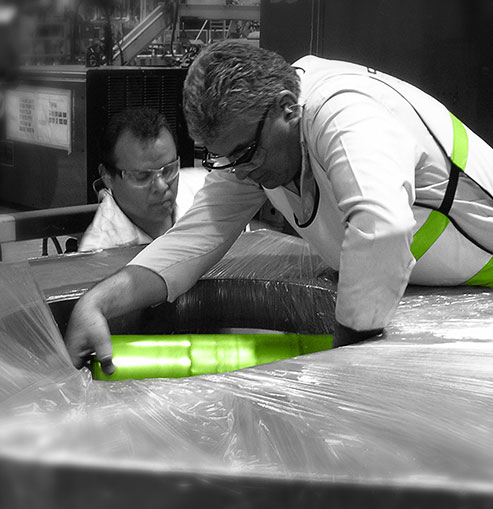 February 2023
February 2023Different methods of Corrosion Prevention
Corrosion is a natural process that results in the degradation of metal surfaces, causing them to lose their strength and stability over time. This process is a major concern for various industries, especially in the transportation, construction, and engineering sectors. Thus, preventing corrosion is essential for industries and individuals to maintain the integrity and longevity of their assets.
Here are some of the most effective methods of corrosion prevention:
Coating: One of the most common methods of corrosion prevention is applying coatings to metal surfaces. The coatings act as a barrier between the metal and the environment, preventing the corrosion from spreading. Coatings can be made from materials such as paint, plastic, or zinc.
Galvanization: Galvanization is the process of coating metal surfaces with a layer of zinc. The zinc coating acts as a sacrificial anode, corroding in place of the metal underneath, thus protecting it from rust and other forms of corrosion.
Electroplating: Electroplating is another common method of corrosion prevention. This process involves coating metal surfaces with a layer of another metal, such as nickel or chrome, using an electrical process. This creates a barrier that prevents the underlying metal from corroding.
Anodizing: Anodizing is a process that creates a protective oxide layer on the surface of metal. This process makes the metal more resistant to corrosion and improves its durability.
Cathodic protection: Cathodic protection is a method that uses an electrical current to prevent corrosion. The current is applied to the metal surface, which creates a protective layer that prevents the metal from corroding. This method is commonly used to protect offshore structures, pipelines, and storage tanks.
Alloying: Alloying is the process of adding other metals to a base metal to improve its properties, including its resistance to corrosion. For example, adding chromium to steel produces stainless steel, which is highly resistant to rust and other forms of corrosion.
Inhibitors: Corrosion inhibitors are chemical substances that are added to a metal surface or to the environment surrounding the metal to slow down the rate of corrosion. There are several different types of inhibitors, including organic inhibitors, which are typically used to protect metal surfaces in storage and transportation, and inorganic inhibitors, which are used to protect metal surfaces in industrial processes. Corrosion inhibitors like Rust Preventive Oils, Waxes, Coatings, VCIs, etc. provides temporary barrier protection from corrosion.
Temporary Barrier Protection: It is the conventional rust protection method and found one of the appropriate methods to protect the parts from rust, as it allows for flexibility in application, excellent confluence with upstream and downstream requirements and is considered very economical.
Rust Preventive Oil and Waxes form a temporary barrier over the metal surface which provides protection from corrosion. It can be applied by dipping, spraying, or brushing. After the treatment, the material can be easily removed. The coating provides protection from corrosion during manufacturing, shipping, storage, transportation, and distribution.
Protecting metals from rust without the use of oils or physical coating paved the way for the invention of VCI (Volatile Corrosion Inhibitor). Metals can be wrapped or covered with VCI paper or films, and they would remain corrosion free.
In conclusion, these are some of the methods used for corrosion prevention. While each method has its own advantages and disadvantages, the best method for preventing corrosion depends on the type of metal, the environment in which it is used, and the desired level of protection. Regardless of the method chosen, it is important to take steps to prevent corrosion, as it can result in significant costs and disruptions for various industries.
Read Also : VCI Paper Or VCI Film – Which Is The Right Choice?
Daubert CCI® (Contact Corrosion Inhibition) Technology
Daubert CCI® (Contact Corrosion Inhibition) technology is developed for the protection of metal surfaces against corrosion. The CCI technology provides long-lasting protection to metal surfaces through the use of specialized inhibitors that are added directly to the metal surface.
The CCI technology works by forming a protective barrier around the metal surface, preventing corrosive agents from coming into direct contact with the metal. This barrier slows down the corrosion process, preserving the integrity of the metal and extending its lifespan.
The CCI technology is ideal for use in a range of industrial applications, including automotive, aerospace, and defense industries. The inhibitors used in the CCI technology are highly effective in preventing corrosion in harsh environments, such as high humidity, salt spray, and corrosive chemicals.
One of the key benefits of the CCI technology is its versatility. It can be used on a wide range of metal surfaces, including aluminium, steel, and stainless steel, and can be applied through a variety of methods, including dipping, brushing, and spraying. This makes the Daubert CCI® technology an ideal solution for a range of corrosion protection needs.
Daubert VCI® (Volatile Corrosion Inhibition) Technology
Daubert VCI® (Volatile Corrosion Inhibitor) technology is widely used in the metal processing industry to protect metal parts from corrosion during storage and transportation. The technology is based on the use of specially formulated VCI products, such as paper, film, or emitter, which emit VCI molecules that form a protective layer on the surface of metal parts. This layer prevents the metal from being exposed to the environment, protecting it from rust and other forms of corrosion.
VCI technology is highly effective in preserving the integrity and quality of metal parts, especially in harsh environments where traditional rust inhibitors may not be sufficient. The VCI products are non-toxic and environmentally friendly, making them an ideal choice for industries with strict environmental regulations.
In the metal processing industry, Daubert VCI® is widely used for the protection of various metal parts, including steel, aluminium, and brass. The technology is also suitable for use in the packaging of delicate machinery, electrical components, and other critical metal parts.
By Mudit Mathur
(Senior Manager, Product Management & Marketing)

